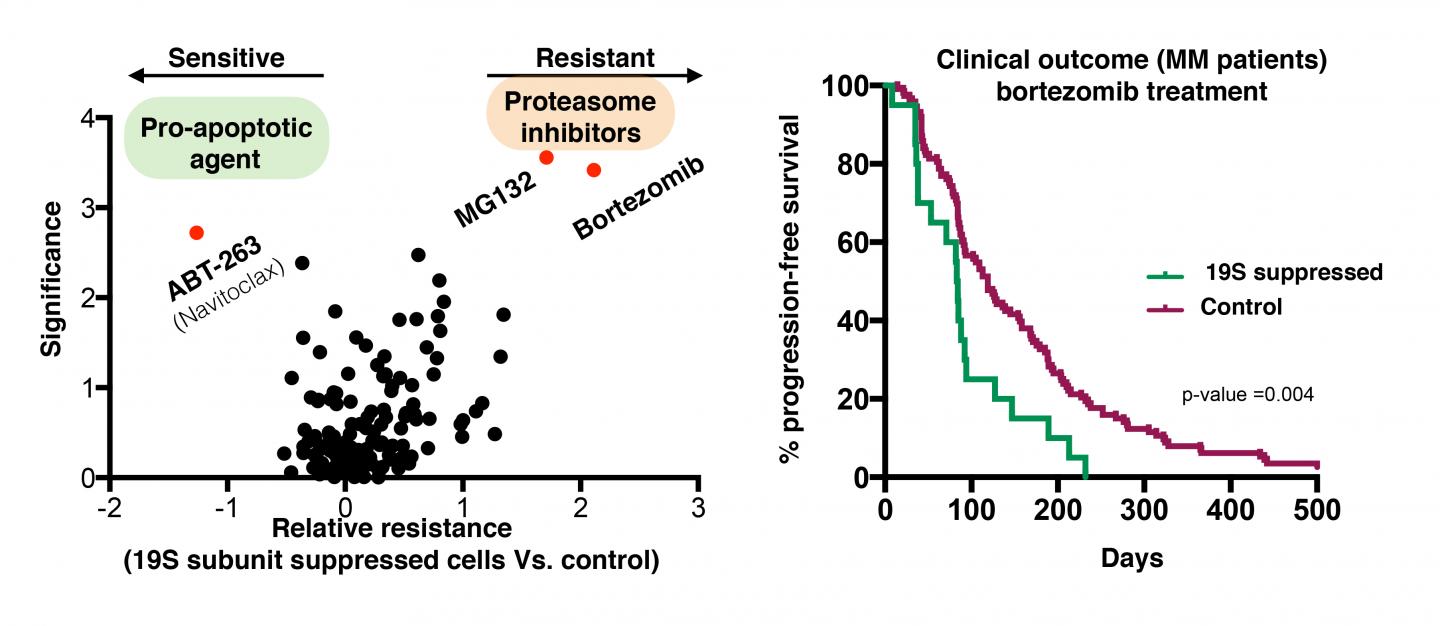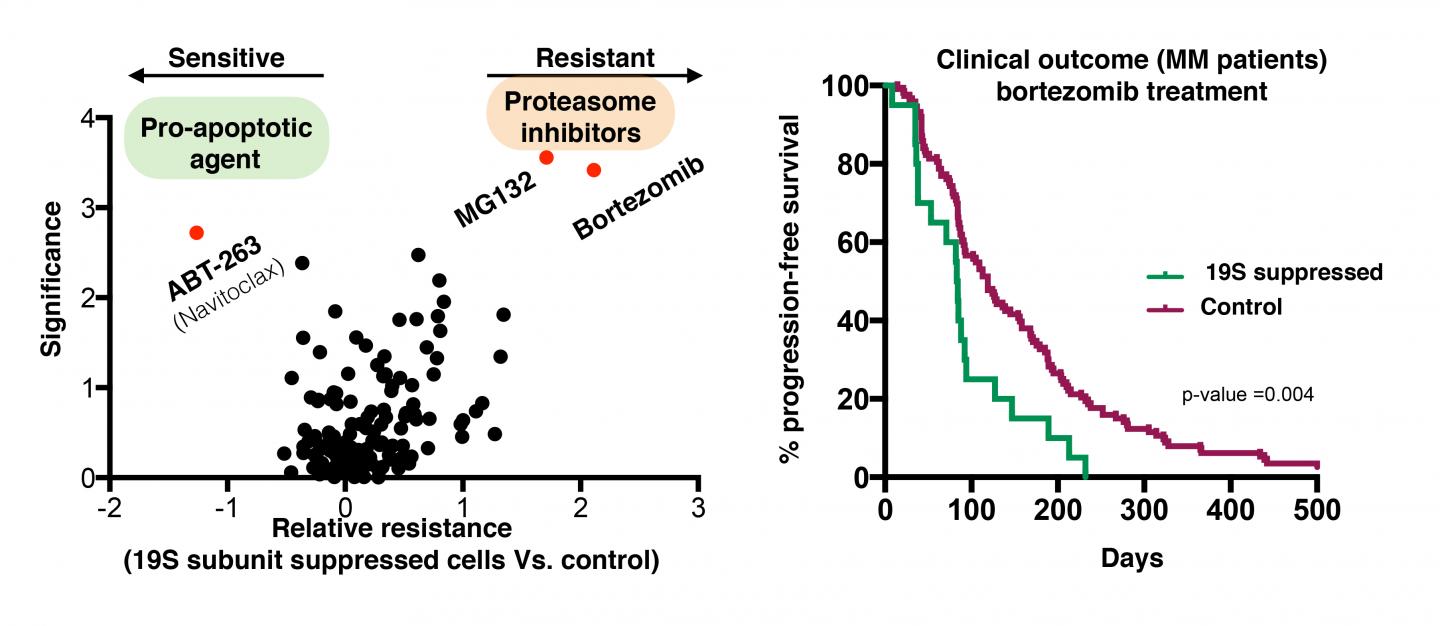
Figure on the left:
Analyzing the relative sensitivity of hundreds of cancer cell lines to commonly used anti-cancer drugs (each dot) reveals that cells with suppressed expression of one proteasome cap…
Credit: Peter Tsvetkov
(Cambridge, Mass.) December 26, 2016–The use of proteasome inhibitors to treat cancer has been greatly limited by the ability of cancer cells to develop resistance to these drugs. But Whitehead Institute researchers have found a mechanism underlying this resistance–a mechanism that naturally occurs in many diverse cancer types and that may expose vulnerabilities to drugs that spur the natural cell-death process.
This finding–which also identifies a biomarker that can be used to gain a deeper understanding of the proteasome inhibitor-resistant state– is reported in the Proceedings of the National Academy of Sciences (PNAS) in an article entitled, Suppression of 19S proteasome subunits marks emergence of an altered cell state in diverse cancers.
Proteasomes are large protein complexes that mediate protein degradation and play a crucial role in maintaining protein equilibrium within the cell. When cells become cancerous, tremendous stresses are placed on the cellular machinery responsible for maintaining protein equilibrium–and that machinery is the target of anti-cancer drugs called proteasome inhibitors. Although proteasome inhibitors are very efficient in selective killing of cancer tumor cells grown in a dish (in-vitro), their success in the clinic has largely been undermined by the development of resistance–mechanisms of which are poorly understood.
"However, recently, we discovered a counterintuitive mechanism by which cells can acquire resistance to proteasome inhibitors in vitro," explains Peter Tsvetkov, lead author of the PNAS article and a post-doctoral researcher at Whitehead Institute. "Now, in this report, we show that this mechanism is at work in many human cancers. Moreover, we have determined that the mechanism is symptomatic of a broadly altered state in the cell, with a unique gene signature and newly exposed vulnerabilities that can be targeted with existing drugs." Notably, the mechanism was clearly associated with poor outcome in patients with the blood cancer myeloma, where proteasome inhibitors are a mainstay of treatment.
Analyzing data from thousands of cancer lines and tumors, the researchers found that those demonstrating resistance to proteasome inhibitor drugs were marked by suppressed expression of one or more of the cells' proteasome cap subunits (which are a subsets of the larger proteasome). Suppressing the expression of even one of the many subunits making up the cap will impair the assembly of the whole cap, resulting in a proteasome-inhibitor resistant state. "This fact reinforces just how complex the mechanisms of resistance to chemotherapy can be," says Luke Whitesell, a senior author of the PNAS paper and senior scientist at Whitehead Institute
Nevertheless, this new report reveals a strategy to address such resistance which may have broad utility. The researchers found that, beyond conferring resistance to proteasome inhibitors, the suppressed expression of proteasome subunits reflects a broad remodeling of the cell's gene signature. Furthermore, this can also serve as a biomarker to stratify patients for treatment. "That signature marks a heritably altered and therapeutically relevant state in diverse cancers–a state that may expose vulnerability to specific drugs that are already in use in the clinic," Tsvetkov observes. "Cancers can achieve this resistance by multiple mechanisms, genetic or epigenetic. But these findings point us to new strategies and novel compounds that can be developed as treatments that will be more effective for an array of cancer types because they are less susceptible to the emergence of resistance."
###
This work was supported by EMBO fellowship ALTF 739-2011 and the Charles A. King trust postdoctoral fellowship program.
Luke Whitesell is Senior Science at Whitehead Institute.
Peter Tsvetkov is a post-doctoral researcher at Whitehead Institute.
Full Citation: Suppression of 19S proteasome subunits marks emergence of an altered cell state in diverse cancers Proceedings of the National Academy of Sciences, online publication: Dec. 26, 2016
Peter Tsvetkov*,1, Ethan Sokol1,2, Dexter Jin1,2, Zarina Brune1, Prathapan Thiru1, Mahmoud Ghandi3, Levi A. Garraway3,4,5, Piyush Gupta1,2,6,7, Sandro Santagata8, Luke Whitesell1, Susan Lindquist **,1,2,9,
1 Whitehead Institute for Biomedical Research, Cambridge, MA, 02142 2 Department of Biology, Massachusetts Institute of Technology, Cambridge, MA 3 Broad Institute, 415 Main St. Cambridge, MA 02142 4 Dana-Farber Cancer Institute, Harvard Medical School, Boston, MA 5 Department of Medicine, Brigham and Women's Hospital, Harvard Medical School, Boston, MA 6 Koch Institute for Integrative Cancer Research, Cambridge, MA 7 Harvard Stem Cell Institute, Cambridge, MA 02138 8 Department of Pathology, Brigham and Women's Hospital, Harvard Medical School, Boston, MA 9 HHMI, Department of Biology, MIT, Cambridge MA 02139 * Corresponding author **Deceased
Media Contact
Merrill Meadow
[email protected]
339-223-7307
@WhiteheadInst
http://www.wi.mit.edu/index.html
############
Story Source: Materials provided by Scienmag





